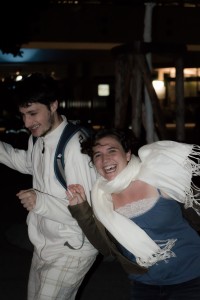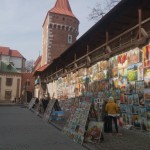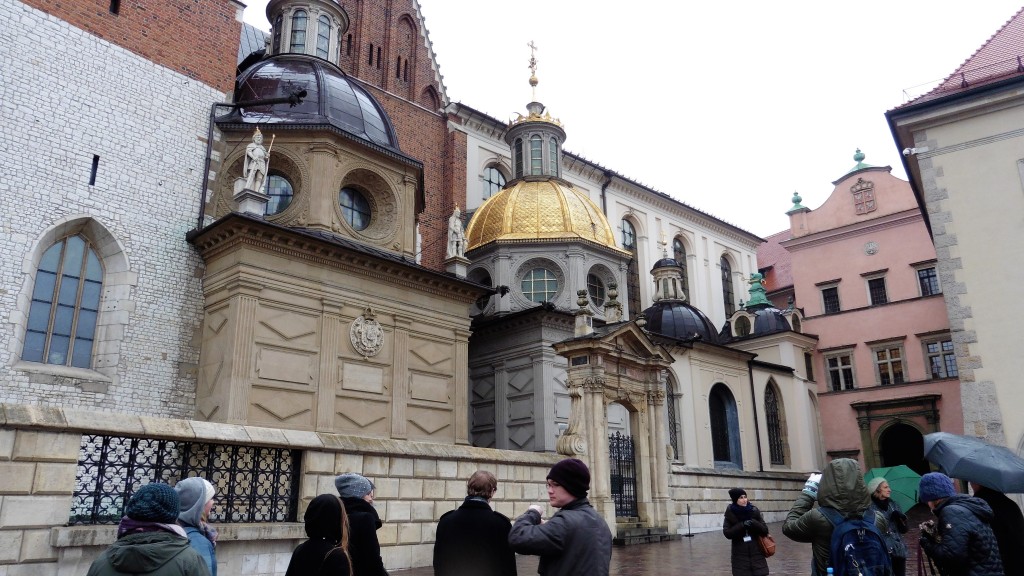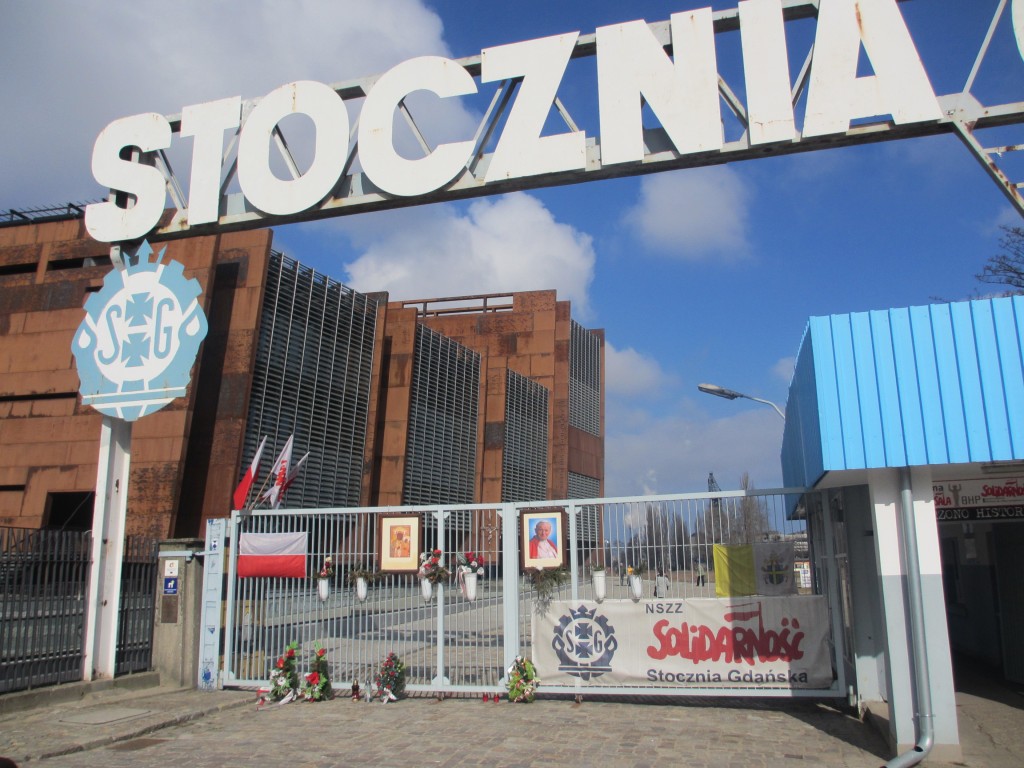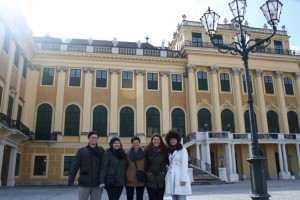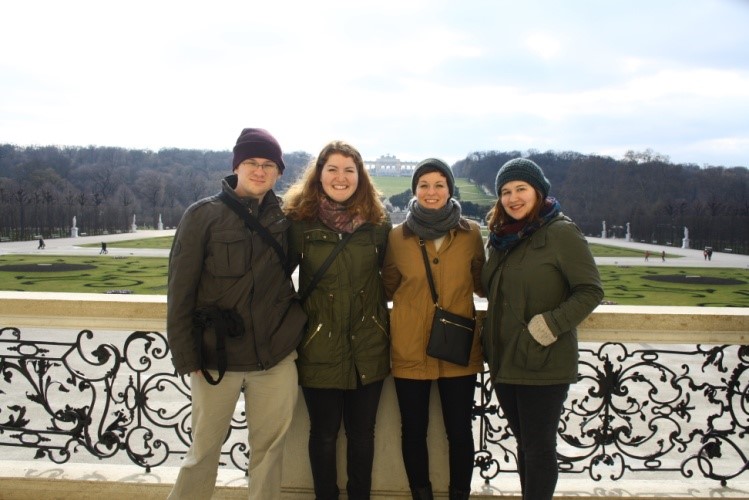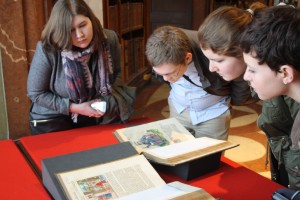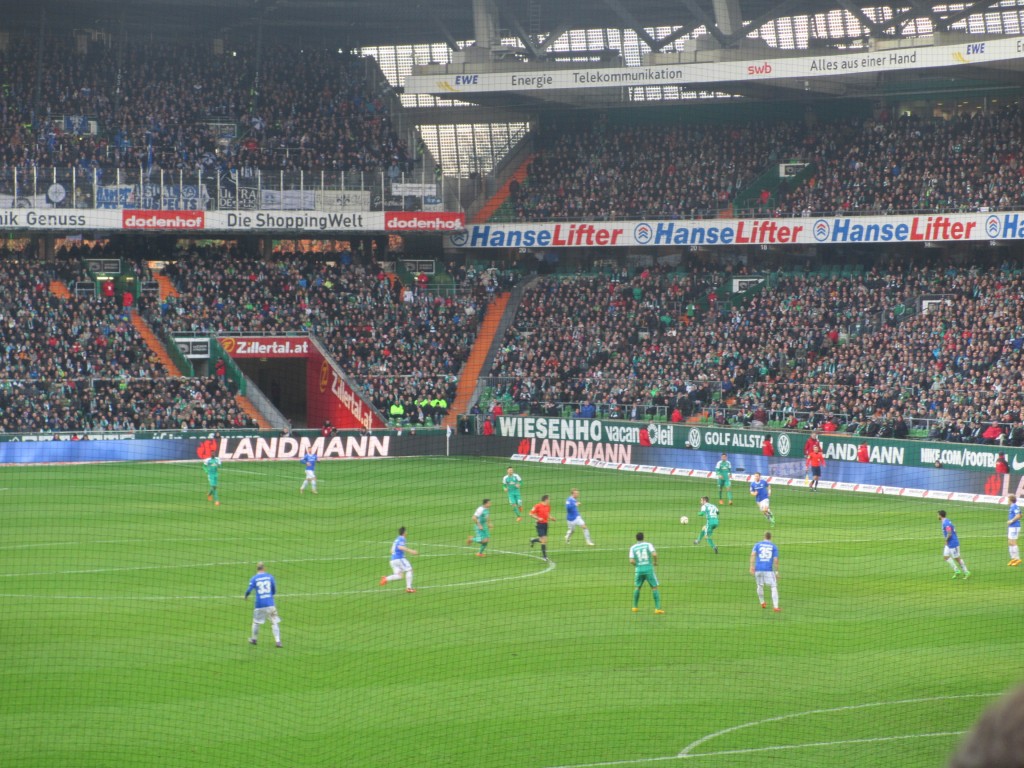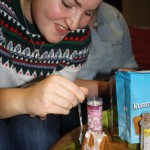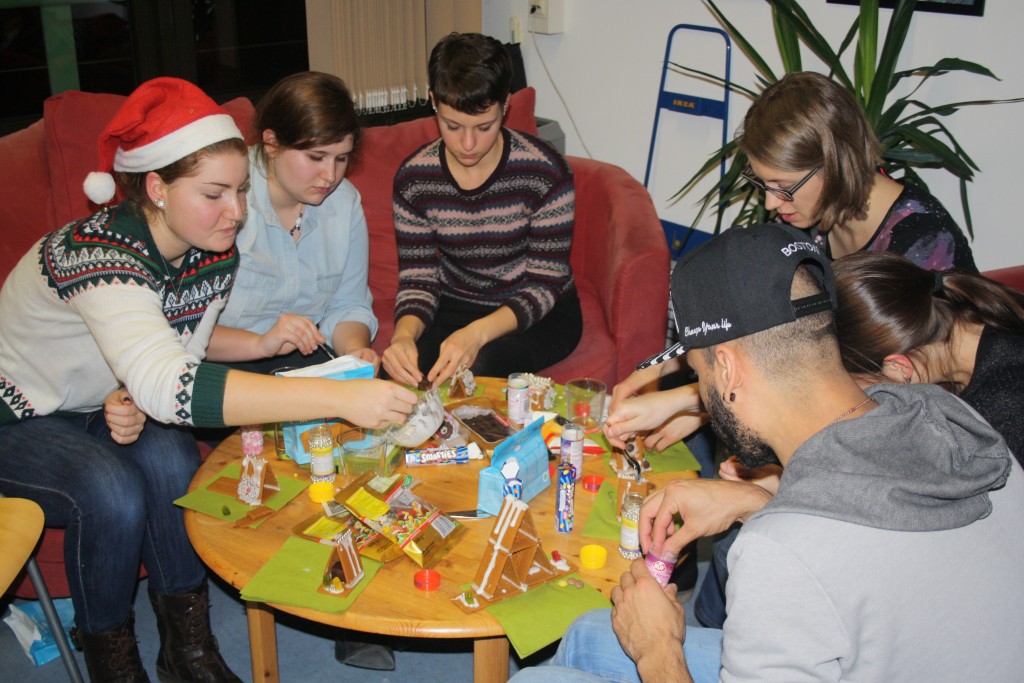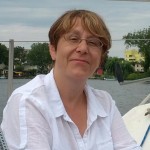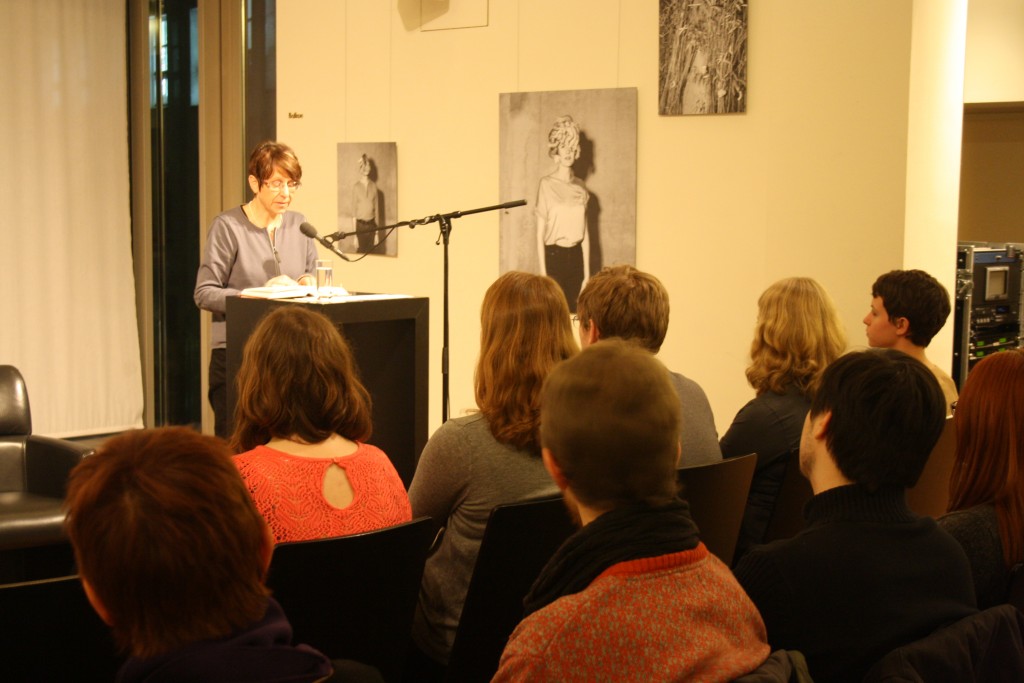Meeting with Hans Modrow
Our Berlin excursion began with the exciting and unique experience to meet the last Premier, or Chairman of the Council of Ministers, of the German Democratic Republic (East Germany), Hans Modrow! Herr Modrow’s fascinating history includes living through four different political and social regime changes in Germany, and he is currently the honorary Chairman of die Linke Party (the Left). Most fitting to our theme of German Reunification was his detailed description and explanation of the political transition in East Germany from the fall of the Berlin Wall on November 9th, 1989 to official reunification, nearly a year later, on October 3rd, 1990. We asked questions about his involvement and opinions on this time and the time since for the better part of three hours. In turn, we received a very interesting perspective from the side of the GDR, a typically lesser known part of recent German history than the West. >Helen Schlimm<
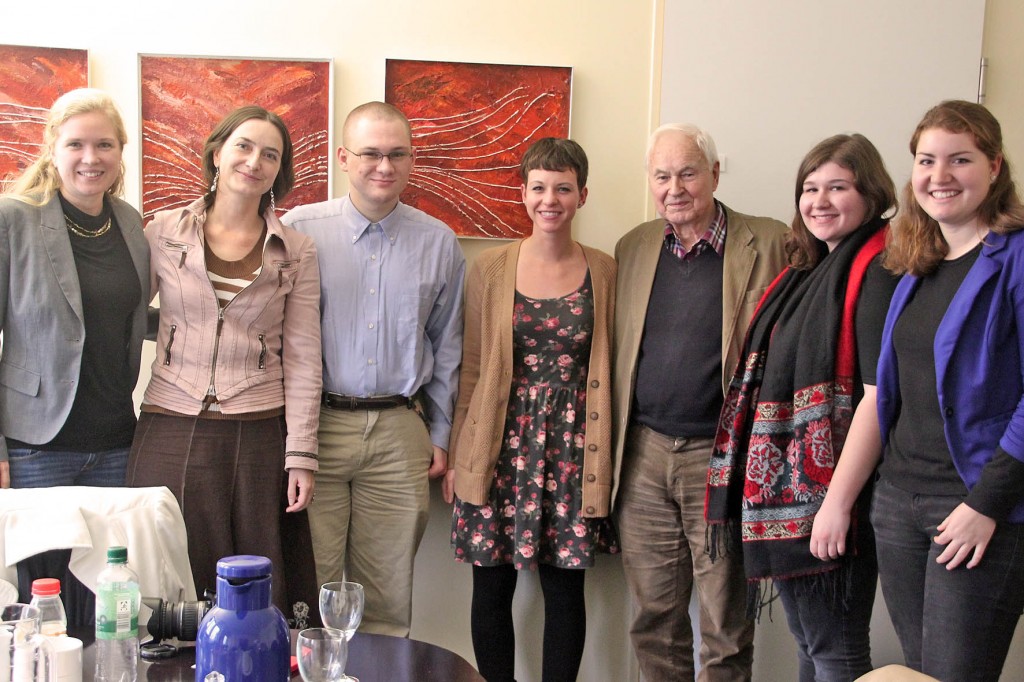
From left to right: Verena Mertz, Janine Ludwig, Ira, Carol, Hans Modrow, Phoebe, Helen. © Frank Schumann
As part of our Berlin trip, we got to meet several political figures from the former German Democratic Republic. We met with Hans Modrow, who was the second last leader of the GDR. We had a long discussion about life, politics of East Germany and the fall of the Berlin Wall. He painted a picture of how the integration of East Germany into the West could have gone and how things would be different for it. Later in the week we had the opportunity to meet member of the Bundestag, Gregor Gysi, who is a leader in the Left party in the Bundestag. With him, we also discussed East Germany and the fall of the Berlin wall. We also learned about the current political climate surrounding the former GDR, such as the debate about whether or not the GDR was a nation built upon the rule of law. From both of these meetings with influential political figures, we gained a much deeper understanding of the politics that surrounded the fall of the Berlin Wall and the ramifications of German unity. >Ira Lauer<
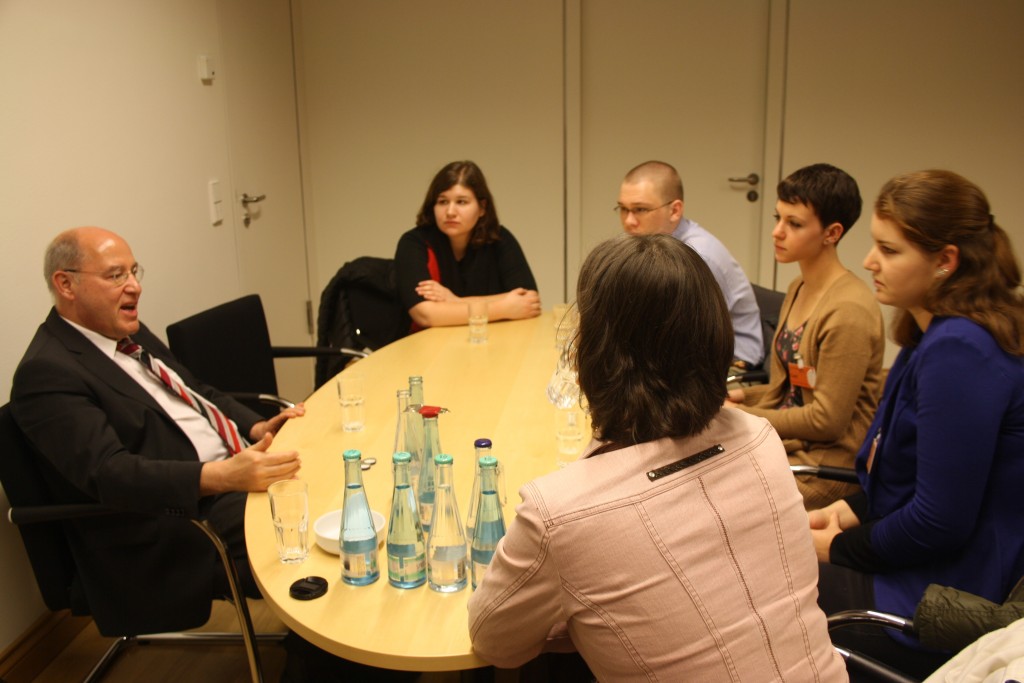
Left: Dr. Gregor Gysi. From front: Janine Ludwig, Helen, Carol, Ira, Phoebe. © Verena Mertz
Meeting at the Federal Foreign Office (Auswärtiges Amt)
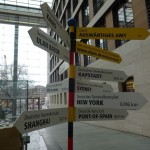 Our group also got the fascinating chance to meet with a member of the Transatlantic Coordinator’s Office at the Federal Foreign Office! We were lead through a tour of the unique space that was also the National Bank for the Third Reich and the Central Seat of the Socialist Unity Party of East Germany, take (unofficial) press photos, and even got to ride on a Paternoster lift! We had a lively talk and discussion of our questions relating to the American-German relationship in the past, present and future. Themes included the Office’s strategies to inform more Americans and Germans of their program and the importance of the relationship between the two countries, the upcoming presidential elections in the US, and stereotypes of both cultures and how or if they can be changed in the future. It was an extremely interesting meeting and tied in very nicely with our class this semester taught by Janine: Kultur heißt Vergleichen- USA/Deutschland. >Helen Schlimm<
Our group also got the fascinating chance to meet with a member of the Transatlantic Coordinator’s Office at the Federal Foreign Office! We were lead through a tour of the unique space that was also the National Bank for the Third Reich and the Central Seat of the Socialist Unity Party of East Germany, take (unofficial) press photos, and even got to ride on a Paternoster lift! We had a lively talk and discussion of our questions relating to the American-German relationship in the past, present and future. Themes included the Office’s strategies to inform more Americans and Germans of their program and the importance of the relationship between the two countries, the upcoming presidential elections in the US, and stereotypes of both cultures and how or if they can be changed in the future. It was an extremely interesting meeting and tied in very nicely with our class this semester taught by Janine: Kultur heißt Vergleichen- USA/Deutschland. >Helen Schlimm<
Julian Assange & the BStU
When I first learned that a mass Skype-call with founder of WikiLeaks Julian Assange was on the schedule for the day, I had two initial reactions: firstly, one of excitement that I was to be given an opportunity to be in attendance during a critical contemporary dialogue led by one of the most influential whistle-blowers of the modern age, but secondly one of surprise as well. After speaking with two relevant German political icons earlier that day, the last communist premier of East Germany, Hans Modrow, and the last leader of the Socialist Unity Party (SED) in East Germany, Gregor Gysi, I was curious to see how listening to the ideas of an Australian journalist would fit with our excursion’s overall theme of the division and unification of East and West Germany. What this Skype event quickly helped me to realize, however, was that there really is an incredible amount of thematic overlap with what is happening in the world today and what was happening behind the Wall not too long ago, particularly concerning the right to access information, the notion of privacy, and the necessity of recognizing and spreading the truth. These ideas constituted the theme of the night’s conversation with Assange, titled “The End of Democracy.”
Julian Assange warned us in his speech against the power of technology and of the unchallenged authority of the Silicon Valley. He told us of Google’s geopolitical aspirations, of its closely-established relationship with the United States government, and of its frighteningly-powerful surveillances capabilities. He called us to arms in the fight for justice for a world of clarity and truth, to expose the reality that we are living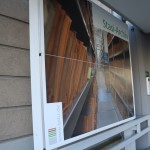 behind our own virtual “Wall,” while being watched by our own kind of Stasi, an overlord we ourselves have chosen and support both through our dependency on technology and our compliancy to resist the implementation of a severely-limited sense of freedom in today’s world. These ideas were still fresh in my mind when the Dickinson group visited the BStU (Official German Stasi Archive) the next day. >Carol Rynar<
behind our own virtual “Wall,” while being watched by our own kind of Stasi, an overlord we ourselves have chosen and support both through our dependency on technology and our compliancy to resist the implementation of a severely-limited sense of freedom in today’s world. These ideas were still fresh in my mind when the Dickinson group visited the BStU (Official German Stasi Archive) the next day. >Carol Rynar<
We went to Hohenschönhausen in Berlin, the former prison for the East German Ministry of State Security, the Stasi. A former prisoner, who had an amazing and moving story of imprisonment, gave us a tour. We saw rooms where prisoners stayed which were comprised of a wooden bunk and a bucket for a toilet. We saw a reproduction of a Chinese torture apparatus, in which water was slowly dripped on the person’s forehead for an indefinite amount of time. I was surprised to hear that 90% of the prisoners in Hohenschönhausen were innocent of the so-called crimes they committed. Our tour guide was imprisoned for helping others escape over the wall. The second time he tried himself to escape, he was captured. His best friend was shot and killed. He was put in solitary confinement for 3 years. When he was released, he continued to help people escape into the West. Because of his intense, life-long fight against oppression, he isolated his wife and children, leading to a long estrangement. He told us this with a shaking voice and teary eyes. At this point, the language barrier didn’t matter. I could see and sense his pain, but could only imagine how much he hurts. I couldn’t help but wonder how difficult it must be for him to walk through the halls of the prison daily. Has he numbed himself to the painful physical and emotional memories? Or perhaps in informing others of his difficult plight, he is given strength; there is a renewed purpose to what happened. The tour through Hohenschönhausen was a moving experience and I learned a lot. I would definitely recommend a visit.
During our free time, Helen, Carol and I went to the Museumsinsel and visted the Alte Nationalgalerie (Old National Gallery), which presents a collection of 19th century art. We saw pieces by Adolph von Menzel, Claude Monet, Max Liebermann, Auguste Renoir and our personal favorite, Caspar David Friedrich. It was really cool to see art that we studied in “German Cultures!” The museum itself was stunning, modeled after the Acropolis of Athens. Afterwards, we walked over to the Berliner Dom and for an afternoon, we enjoyed being surrounded by beautiful architecture. >Phoebe Allebach<
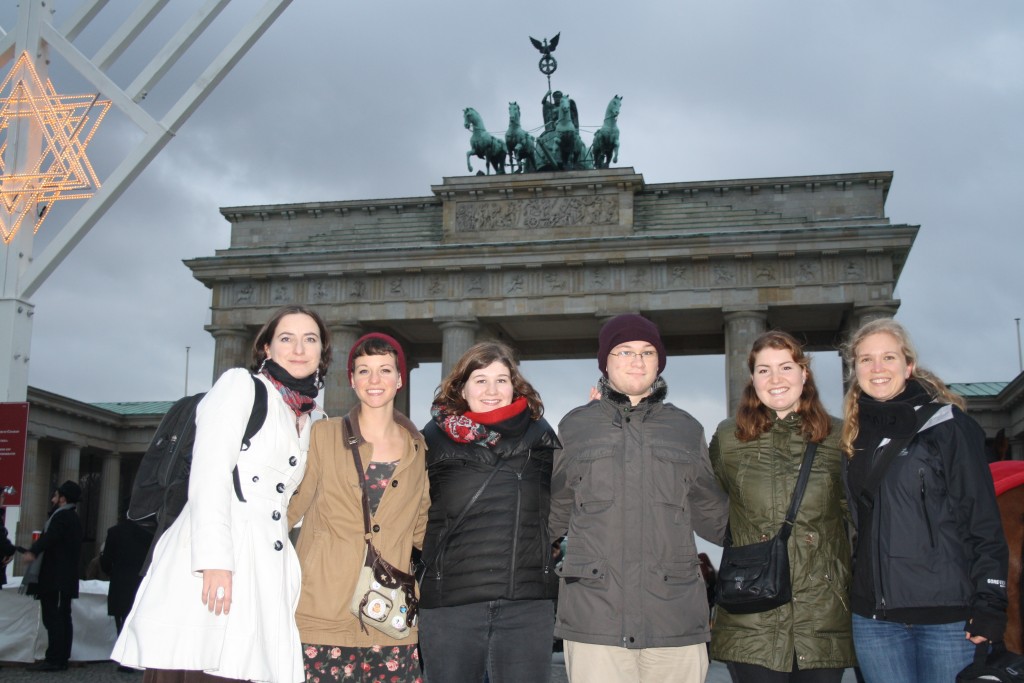
From left to right: Janine Ludwig, Carol, Phoebe, Ira, Helen, Verena Mertz






